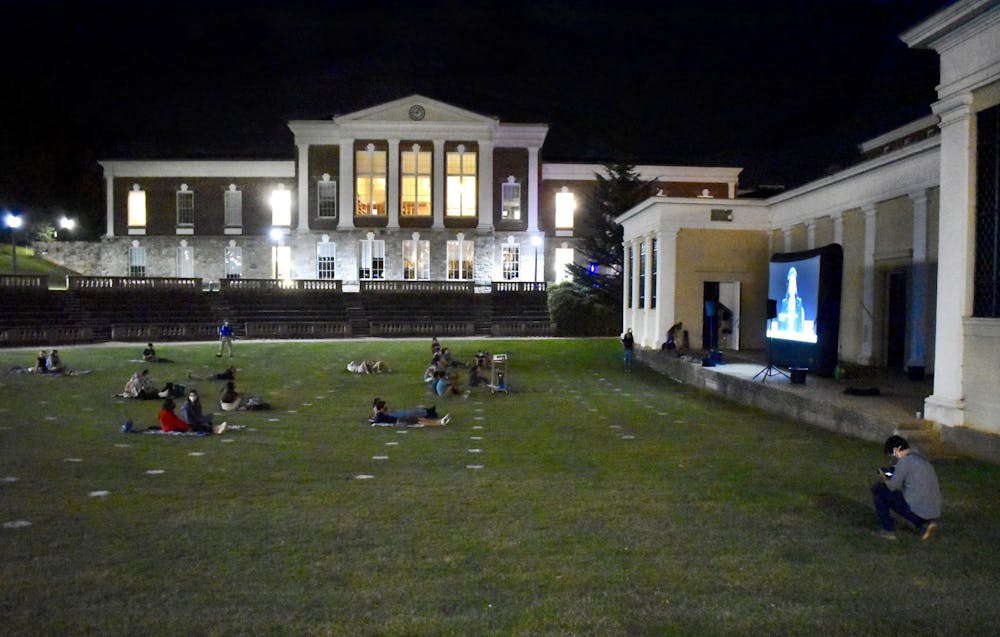The Democracy Initiative Student Advisory Council hosted a watch party for the presidential debate between President Donald Trump and former Vice President Joe Biden on Thursday evening. The event took place in the amphitheater and adhered to University COVID-19 guidelines.
About 50 students sat in the grass and on the stairs of the amphitheater to watch, and the debate was projected onto a large screen in front of Bryan Hall, live-streaming the debate between Trump and Biden, as moderated by Kristen Welker of NBC News from Belmont University in Nashville, TN.
According to third-year College student Noah Strike, a member of the Democracy Initiative Student Advisory Council, screening this debate in the amphitheater carried out the mission of the Democracy Initiative, but also provided a way for students to safely gather in person.
“It’s really important that students engage with the democratic process and the electoral process [and] when an opportunity to facilitate that engagement arises, it’s really important that we take it and create a space where students can go and engage with political candidates [and] political positions, peacefully,” Strike said.
The Democracy Initiative was founded in 2018 to study the challenges faced by democracies and aims “to influence policies that strengthen democracy at home and worldwide,” according to its mission statement.
Strike said that the Student Advisory Council was also working on a public art installation and get-out-the-vote initiatives.
More than just an opportunity for students to participate in the democratic process, Strike also felt like this event was an easy way to facilitate community at a time when many students feel isolated.
“When a circumstance arises where we can host an event like this ... I think it’s really important that we take that opportunity,” Strike said.
The event abided by social distancing guidelines, requiring students to limit groups to five people and leave at least six feet between groups. Students also had to wear a mask for the entire time, and food and drinks were not allowed. They were also required to pre-register online.
At the event, groups of students were spaced six feet apart and adhered to the guidelines requiring them to keep masks on the entire time. An RMC Events staff member walked around the amphitheater to ensure that students complied with guidelines.
Strike and other members of the Student Advisory Council had to reach out to many administrators and faculty to hold the screening. They had to get permission from the Student Affairs Office for an exception to the University’s 10 person maximum rule, then request permission to use the amphitheater. They also had to work with the University to put markings on the grass to show students how to maintain social distancing.
Although the logistics were complicated, Strike said that faculty members were helpful and hopeful about the event.
“All the administrators were super excited to see something that students could do,” Strike said.
He also discussed how the Initiative wants to hold larger discussions in the future to help encourage political discourse, but logistically with social distancing, it is very difficult.
At the screening, a few students noted how this was the first they had heard about the Democracy Initiative. The Initiative itself is quite new, formed in 2018, and the Student Advisory Council was organized this spring. The Democracy Initiative selected 17 students who submitted applications to serve on the Student Advisory Council. Each student receives a stipend of $500 per semester and serves a term of one academic year. The watch party is one of their first events because their plans have been extremely limited by COVID-19 regulations.
During the debate itself, Trump and Biden discussed topics such as the response to COVID-19, the timeline of a potential vaccine, U.S. reliance on the oil industry, racism and the healthcare system.
At the screening, students seemed excited and hopeful about watching the debate. Sydney O’Connell and Kara Tung — both first years in the College — attended the event together.
“I thought the first debate was a train wreck,” O’Connell said. “But I’m really impressed so far at the muting [of candidates’ microphones] and I’m looking for a more civilized debate tonight.”
The screening gave students an opportunity to watch the debate with friends, and O’Connell and Tung expressed excitement about being able to watch it in a public space, especially given the lack of public events due to COVID-19.
“I think this was a really good idea. It was really nice to get out of our rooms,” O’Connell said.







